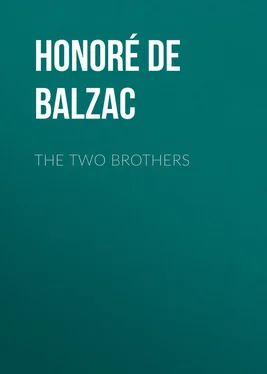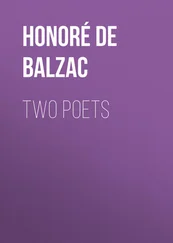Honoré Balzac - The Two Brothers
Здесь есть возможность читать онлайн «Honoré Balzac - The Two Brothers» — ознакомительный отрывок электронной книги совершенно бесплатно, а после прочтения отрывка купить полную версию. В некоторых случаях можно слушать аудио, скачать через торрент в формате fb2 и присутствует краткое содержание. Жанр: literature_19, foreign_antique, foreign_prose, на английском языке. Описание произведения, (предисловие) а так же отзывы посетителей доступны на портале библиотеки ЛибКат.
- Название:The Two Brothers
- Автор:
- Жанр:
- Год:неизвестен
- ISBN:нет данных
- Рейтинг книги:4 / 5. Голосов: 1
-
Избранное:Добавить в избранное
- Отзывы:
-
Ваша оценка:
- 80
- 1
- 2
- 3
- 4
- 5
The Two Brothers: краткое содержание, описание и аннотация
Предлагаем к чтению аннотацию, описание, краткое содержание или предисловие (зависит от того, что написал сам автор книги «The Two Brothers»). Если вы не нашли необходимую информацию о книге — напишите в комментариях, мы постараемся отыскать её.
The Two Brothers — читать онлайн ознакомительный отрывок
Ниже представлен текст книги, разбитый по страницам. Система сохранения места последней прочитанной страницы, позволяет с удобством читать онлайн бесплатно книгу «The Two Brothers», без необходимости каждый раз заново искать на чём Вы остановились. Поставьте закладку, и сможете в любой момент перейти на страницу, на которой закончили чтение.
Интервал:
Закладка:
Under the Consulate, Bridau attached himself fanatically to Napoleon, who placed him at the head of a department in the ministry of the interior in 1804, a year before the death of Doctor Rouget. With a salary of twelve thousand francs and very handsome emoluments, Bridau was quite indifferent to the scandalous settlement of the property at Issoudun, by which Agathe was deprived of her rightful inheritance. Six months before Doctor Rouget’s death he had sold one-half of his property to his son, to whom the other half was bequeathed as a gift, and also in accordance with his rights as heir. An advance of fifty thousand francs on her inheritance, made to Agathe at the time of her marriage, represented her share of the property of her father and mother.
Bridau idolized the Emperor, and served him with the devotion of a Mohammedan for his prophet; striving to carry out the vast conceptions of the modern demi-god, who, finding the whole fabric of France destroyed, went to work to reconstruct everything. The new official never showed fatigue, never cried “Enough.” Projects, reports, notes, studies, he accepted all, even the hardest labors, happy in the consciousness of aiding his Emperor. He loved him as a man, he adored him as a sovereign, and he would never allow the least criticism of his acts or his purposes.
From 1804 to 1808, the Bridaus lived in a handsome suite of rooms on the Quai Voltaire, a few steps from the ministry of the interior and close to the Tuileries. A cook and footman were the only servants of the household during this period of Madame Bridau’s grandeur. Agathe, early afoot, went to market with her cook. While the latter did the rooms, she prepared the breakfast. Bridau never went to the ministry before eleven o’clock. As long as their union lasted, his wife took the same unwearying pleasure in preparing for him an exquisite breakfast, the only meal he really enjoyed. At all seasons and in all weathers, Agathe watched her husband from the window as he walked toward his office, and never drew in her head until she had seen him turn the corner of the rue du Bac. Then she cleared the breakfast-table herself, gave an eye to the arrangement of the rooms, dressed for the day, played with her children and took them to walk, or received the visits of friends; all the while waiting in spirit for Bridau’s return. If her husband brought him important business that had to be attended to, she would station herself close to the writing-table in his study, silent as a statue, knitting while he wrote, sitting up as late as he did, and going to bed only a few moments before him. Occasionally, the pair went to some theatre, occupying one of the ministerial boxes. On those days, they dined at a restaurant, and the gay scenes of that establishment never ceased to give Madame Bridau the same lively pleasure they afford to provincials who are new to Paris. Agathe, who was obliged to accept the formal dinners sometimes given to the head of a department in a ministry, paid due attention to the luxurious requirements of the then mode of dress, but she took off the rich apparel with delight when she returned home, and resumed the simple garb of a provincial. One day in the week, Thursday, Bridau received his friends, and he also gave a grand ball, annually, on Shrove Tuesday.
These few words contain the whole history of their conjugal life, which had but three events; the births of two children, born three years apart, and the death of Bridau, who died in 1808, killed by overwork at the very moment when the Emperor was about to appoint him director-general, count, and councillor of state. At this period of his reign, Napoleon was particularly absorbed in the affairs of the interior; he overwhelmed Bridau with work, and finally wrecked the health of that dauntless bureaucrat. The Emperor, of whom Bridau had never asked a favor, made inquiries into his habits and fortune. Finding that this devoted servant literally had nothing but his situation, Napoleon recognized him as one of the incorruptible natures which raised the character of his government and gave moral weight to it, and he wished to surprise him by the gift of some distinguished reward. But the effort to complete a certain work, involving immense labor, before the departure of the Emperor for Spain caused the death of the devoted servant, who was seized with an inflammatory fever. When the Emperor, who remained in Paris for a few days after his return to prepare for the campaign of 1809, was told of Bridau’s death he said: “There are men who can never be replaced.” Struck by the spectacle of a devotion which could receive none of the brilliant recognitions that reward a soldier, the Emperor resolved to create an order to requite civil services, just as he had already created the Legion of honor to reward the military. The impression he received from the death of Bridau led him to plan the order of the Reunion. He had not time, however, to mature this aristocratic scheme, the recollection of which is now so completely effaced that many of my readers may ask what were its insignia: the order was worn with a blue ribbon. The Emperor called it the Reunion, under the idea of uniting the order of the Golden Fleece of Spain with the order of the Golden Fleece of Austria. “Providence,” said a Prussian diplomatist, “took care to frustrate the profanation.”
After Bridau’s death the Emperor inquired into the circumstances of his widow. Her two sons each received a scholarship in the Imperial Lyceum, and the Emperor paid the whole costs of their education from his privy purse. He gave Madame Bridau a pension of four thousand francs, intending, no doubt, to advance the fortune of her sons in future years.
From the time of her marriage to the death of her husband, Agathe had held no communication with Issoudun. She lost her mother just as she was on the point of giving birth to her youngest son, and when her father, who, as she well knew, loved her little, died, the coronation of the Emperor was at hand, and that event gave Bridau so much additional work that she was unwilling to leave him. Her brother, Jean-Jacques Rouget, had not written to her since she left Issoudun. Though grieved by the tacit repudiation of her family, Agathe had come to think seldom of those who never thought of her. Once a year she received a letter from her godmother, Madame Hochon, to whom she replied with commonplaces, paying no heed to the advice which that pious and excellent woman gave to her, disguised in cautious words.
Some time before the death of Doctor Rouget, Madame Hochon had written to her goddaughter warning her that she would get nothing from her father’s estate unless she gave a power of attorney to Monsieur Hochon. Agathe was very reluctant to harass her brother. Whether it were that Bridau thought the spoliation of his wife in accordance with the laws and customs of Berry, or that, high-minded as he was, he shared the magnanimity of his wife, certain it is that he would not listen to Roguin, his notary, who advised him to take advantage of his ministerial position to contest the deeds by which the father had deprived the daughter of her legitimate inheritance. Husband and wife thus tacitly sanctioned what was done at Issoudun. Nevertheless, Roguin had forced Bridau to reflect upon the future interests of his wife which were thus compromised. He saw that if he died before her, Agathe would be left without property, and this led him to look into his own affairs. He found that between 1793 and 1805 his wife and he had been obliged to use nearly thirty thousand of the fifty thousand francs in cash which old Rouget had given to his daughter at the time of her marriage. He at once invested the remaining twenty thousand in the public funds, then quoted at forty, and from this source Agathe received about two thousand francs a year. As a widow, Madame Bridau could live suitably on an income of six thousand francs. With provincial good sense, she thought of changing her residence, dismissing the footman, and keeping no servant except a cook; but her intimate friend, Madame Descoings, who insisted on being considered her aunt, sold her own establishment and came to live with Agathe, turning the study of the late Bridau into her bedroom.
Читать дальшеИнтервал:
Закладка:
Похожие книги на «The Two Brothers»
Представляем Вашему вниманию похожие книги на «The Two Brothers» списком для выбора. Мы отобрали схожую по названию и смыслу литературу в надежде предоставить читателям больше вариантов отыскать новые, интересные, ещё непрочитанные произведения.
Обсуждение, отзывы о книге «The Two Brothers» и просто собственные мнения читателей. Оставьте ваши комментарии, напишите, что Вы думаете о произведении, его смысле или главных героях. Укажите что конкретно понравилось, а что нет, и почему Вы так считаете.












